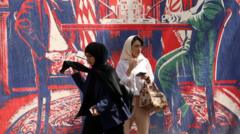The International Atomic Energy Agency has reported a startling rise in Iran's highly enriched uranium, intensifying global concern over the country's nuclear intentions.
Escalating Concerns Over Iran’s Uranium Enrichment, Warns IAEA

Escalating Concerns Over Iran’s Uranium Enrichment, Warns IAEA
The UN nuclear agency raises alarms over Iran's significant increase in uranium stockpile, prompting fears of potential weaponization.
Iran has reportedly intensified its uranium enrichment efforts, raising alarms within the international community, particularly the UN's nuclear watchdog, the International Atomic Energy Agency (IAEA). In a confidential report examined by the BBC, the IAEA disclosed that Iran possesses more than 400kg of uranium enriched to 60% purity, a level dangerously close to weapons-grade material. This marked a nearly 50% increase over just three months, with the potential to produce roughly ten nuclear weapons if further refined.
IAEA Director General Rafael Grossi expressed "serious concern" over this escalation, indicating that Iran's rate of uranium production—equivalent to nearly one nuclear weapon per month—signals a significant shift amid ongoing nuclear negotiations with the United States. The report has opened the path for Western nations, including the US, Britain, France, and Germany, to consider taking formal steps to hold Iran accountable for potential violations of its non-proliferation obligations.
In light of the IAEA findings, Israeli officials accused Iran of being "totally determined" to obtain nuclear weapons, stating that such high levels of enrichment have no civilian justification. Iranian Foreign Minister Abbas Araghchi, however, reiterated Tehran's stance that it finds nuclear weapons "unacceptable," asserting during a televised address that both sides fundamentally agree on the unacceptability of such armaments.
While international negotiations have made strides since April, critical disagreements persist, notably over Iran's right to enrich uranium. The IAEA report also disclosed troubling discoveries about Iran's past nuclear activities, including clandestine programs carried out until the early 2000s, with previously undisclosed sites identified as locations of undeclared nuclear work.
Despite the diplomatic talks aimed at reaching a new nuclear deal, the IAEA's findings suggest that Iran's expansive enrichment activities have not slowed. Recent comments from top advisors to Iran's Supreme Leader have suggested a reevaluation of the nation’s long-standing prohibition against developing nuclear weapons if pressured further by international actors. This alarming rhetoric has raised concerns that Iran is inching closer to a nuclear threshold state.
With the IAEA board set to meet soon to deliberate on the situation, there is growing pressure on Iran to cooperate fully with inspections and adhere to global nuclear norms. Experts anticipate that these developments may lead to Iran being referred to the United Nations Security Council, although the timing for such action remains uncertain as discussions move forward.




















